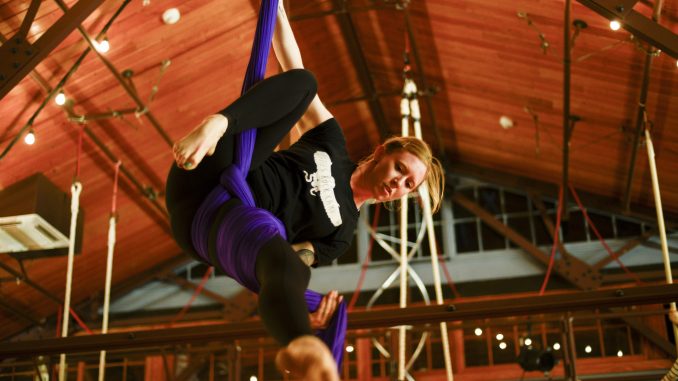
The rules of living are flexible—both on the ground and in the air.
Tangle Movement Arts, a Philadelphia-based aerial dance theater, is exhibiting the explicit and inexplicit rules of shared urban living spaces using the art of contemporary circus.
In “The Girl’s Guide to Neighborly Conduct,” Tangle’s fifth performance in FringeArts, a story unfolds in two Philadelphia row homes as a woman living on her own moves next door to a house with six residents.
The aerial production runs Sept. 10-12 at Philadelphia Soundstages, a commercial videography studio not typically open to the public that Tangle is transforming into a theater space.
“We were really interested in telling a story about people living in close proximity with different rules about how to manage their lives,” said company founder and aerial performer, Lauren Rile Smith. “Taking different universes from people’s private domestic worlds and smashing them together.”
On stage, trapezes and lyras coexist with couches and recycling bins to portray the familiar confrontations that surface when a group of individuals reside under one roof.
The story is comprised of assorted residential issues, like clashing personalities, budding romance and arguing over who should take out the trash.
“We were interested in how we all bring different expectations to our idea of home,” said company member Sal Nicolazzo. “Whether that’s about whether we expect our neighbors to talk to us, how we expect our roommates to do the dishes or which intimate relationships we expect will be recognized and taken seriously.”
Recycling bins are the focal point of one particular scene where dancing takes place on the ground instead of mid-air. For the first time, Tangle is integrating square dancing, which provides contrast to the lyrical aerial work.
It also encompasses the recurring theme of rules.
“Square dancing brings people together in many regimented ways,” Rile Smith said. “From the outside, you may not be able to follow all of the rules, but you see that everyone knows exactly where to go at what time.”
The exploration of societal standards reappears not only as a source of inspiration, but also in the physical technique of the practice. The rules conveyed about neighborly conduct mirror the rules obeyed for performance.
“Coming back to our initial inspiration, delving into the questions of the rules we follow explicitly or have internalized,” Rile Smith said. “There are a lot of rules that go into movement in the air, whether borderline agreements on how to stay safe or whether it’s choreographed traditions that you draw to make new work.”
While suspended from high oakwood ceilings, ideas for the upcoming production are continually shared, molded and woven together by fellow cast members during rehearsals in a small studio space nestled off Germantown Avenue.
“It’s exciting … for me, trapeze training is so individual,” Nicolazzo said. “I focus so much on my own strength and technique and what skills I’m building over time. So it’s really great to have a creative process that’s totally different from that, and so much more about seeing what happens when you put so many different people’s ideas and backgrounds together.”
Like most of Tangle’s pieces, this production illustrates the philosophical foundation the company embraces, which is the testimony and celebration of female empowerment in the most ordinary of places.
“The heart of our work is taking stories of ordinary life and taking the often alienating language of circus to tell them in a relatable way,” Rile Smith said. “It’s telling these stories using aerial acrobatics, which is so frequently about spectacle, rather than story.”
Grace Maiorano can be reached at grace.maiorano@temple.edu.


Be the first to comment